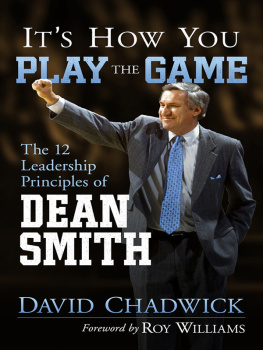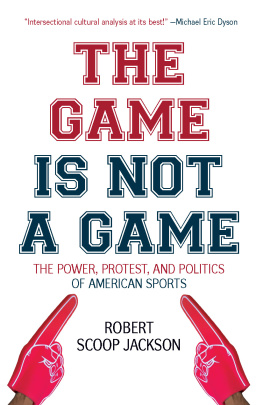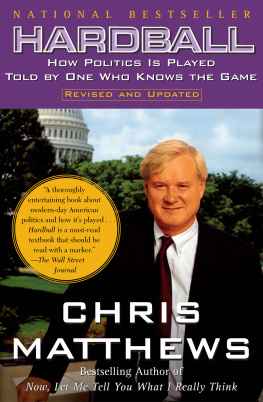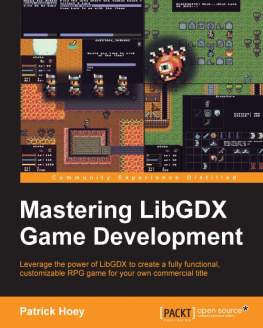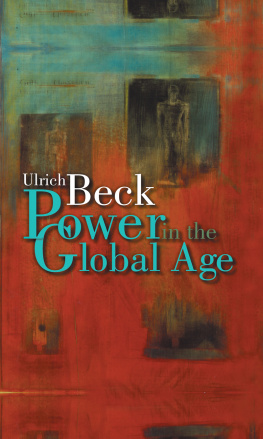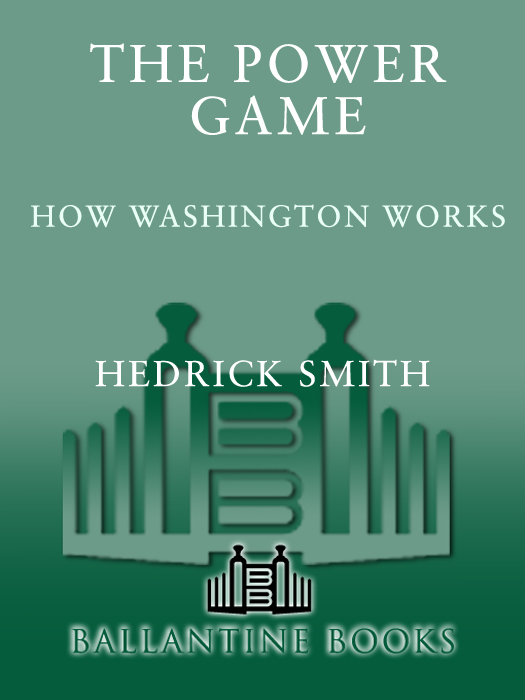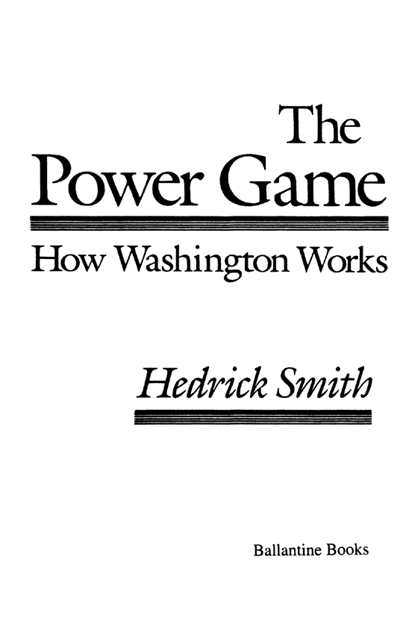More praise for The Power Game
There is some dazzling reporting about the Reagan administration that I havent seen anywhere else.
The Wall Street Journal
A rich groundwork of behind-the-scenes information and revealing gossip.
San Francisco Chronicle
The political book on Washington. It is reporting at its best. As a working persons guide to the strange and evanescent nature of our national government, I doubt that it could be topped. This is a knife with edge.
Los Angeles Times Book Review
No one has done a better or more comprehensive job of explaining how Washington operates at this moment in history. An unforgettable portrait of the people who run our national politics and their culture.
Chicago Tribune
ALSO BY HEDRICK SMITH
The Russians
The Pentagon Papers (coauthor with Neil Sheehan, Fox Butterfield, and E. W. Kenworthy)
Reagan: The Man, the President (coauthor with Adam Clymer, Richard Burt, Leonard Silk, and Robert Lindsey)
Beyond Reagan: The Polititcs of Upheaval (coauthor with Paul Duke, Haynes Johnson, Jack Nelson, Charles Corddry, Charles McDowell, and Georgie Ann Geyer)
The New Russians
Rethinking America
A Ballantine Book
The Random House Publishing Group
Copyright 1988 by Hedrick Smith
All rights reserved.
Published in the United States by Ballantine Books, an imprint of The Random House Publishing Group, a division of Random House, Inc., New York, and simultaneously in Canada by Random House of Canada Limited, Toronto.
Grateful acknowledgment is made to the following for permission to reprint previously published material:
Brookings Institution: Excerpts from The Crisis of Competence in Our National Leadership by James L. Sundquist, which appeared in Political Science Quarterly Vol. 95, No 2 (Summer 1980) p. 192.
CBS Inc.: Excerpts from a CBS Evenings News broadcast of October 4, 1984, in which Leslie Stahl shared her script with the author. Copyright CBS Inc. All rights reserved.
Harper & Row Publishers, Inc.: Excerpts from A Different Kind of Presidency by Theodore C. Sorensen. Copyright 1984 by Theodore C. Sorensen, Eric Sorensen, Stephen Sorensen, and Philip Sorensen. Reprinted by permission of Harper & Row Publishers, Inc.
The New York Times: An excerpt from Deciding Who Makes Foreign Policy by Zbigniew Brzezinski. Copyright 1983 by The New York Times Company. An excerpt from The White House Mystique by John S. D. Eisenhower. Copyright 1987 by The New York Times Company. Excerpts from The Greening of Washington by Kenneth Schlossberg. Copyright 1986 by The New York Times Company. Reprinted by permission.
The Public Interest: Excerpts from The Democratic Distemper by Samuel P. Huntington. Copyright 1975 by National Affairs, Inc. Reprinted with permission of the author from The Public Interest, No. 41 (Fall 1975), p. 27.
Time: Excerpt from Needed: Clarity of Purpose by Richard M. Nixon. Copyright 1980 Time Inc. All rights reserved. Reprinted by permission from Time.
WETA Washington: Excerpts from an interview with Elliot Richardson for PBS-TV documentary entitled The Power and the Glory. Copyright 1982 by Greater WETA Educational Telecommunications Association.
Ballantine and colophon are registered trademarks of Random House, Inc.
www.ballantinebooks.com
Library of Congress Catalog Card Number: 96-96689
eISBN: 978-0-307-82957-3
This edition reprinted by arrangement with Random House, Inc.
v3.1
To Dad,
whose intellect and integrity
have always been a beacon
Acknowledgments
No book is an individual enterprise. This book, like many others, has benefited greatly from the cooperation, assistance, wisdom, and generosity of many peoplemy editor, academic mentors, researchers, news sources, journalistic colleagues, friends, and family.
Five people in particular gave special nourishment and encouragement to this book, for which I am deeply grateful: my father, Sterling Smith, whose lifelong questioning of government and whose relentless probing about the real workings of Washington were a stimulus for me to tackle this subject; Kate Medina, my editor at Random House, whose immediate and persistent enthusiasm for the concept and for the reporting, seasoned with insightful and demanding critiques, provided me with both the lift and spur that I wanted and needed; Austin Ranney, my sponsor and friend at American Enterprise Institute, whose gentle coaching and sheer enjoyment of the power game put fun and reward into the work of writing; Bill Nell, my chief researcher, who poured heart and soul and tireless hours and attention to tasks and facts too numerous to begin to enumerate; and Susan, my wife, whose readers reactions often helped me and whose faith and patience and support nurtured me throughout the writing of this book.
This book would not have been possible without two institutions and their leaders to whom I feel and owe special thanks. Over the past twenty-five years The New York Times has given me the rich opportunity of having a fifty-yard-line seat at the power game, and of getting to know so many government officials and congressional politicians at close hand. I am especially grateful to Publisher Punch Sulzberger, and former Executive Editor Abe Rosenthal for granting me a leave of absence to write the manuscript, and to current Executive Editor Max Frankel, who was understanding when I needed more time.
For one very important year, the American Enterprise Institute for Public Policy Research and its former president. Bill Baroody, Jr., gave me an academic home as a visiting journalist. I am extremely grateful in particular to four senior fellows at AEIAustin Ranney, Michael Malbin, Norm Ornstein, and John Makinfor their willingness to share so much time and knowledge to educate me. Austin Ranney and Tom Mann of Brookings Institution were generous enough to read the manuscript and give me their insights, and I am deeply in their debt, though obviously I alone bear responsibility for the judgments rendered in this volume.
Many members of Congress and administration officials offered me help or accesssome four hundred to five hundred interviewsfar too many for me to list them all. And some of the most helpful asked to remain anonymous. I am grateful to Presidents Reagan and Carter for their interviews with me and for similar access to Speakers Tip ONeill and Jim Wright and Majority Leaders Howard Baker, Bob Dole, and Robert C. Byrd, as well as to scores of members of Congress and several dozen senior Reagan administration officials.
A few peoplenormally less visible to the publicdeserve special mention because they enjoyed analyzing the power game as much as I have and they shared their understanding of the process of governing, and helped me see the patterns more clearly: Richard Darman, who is rich with insights into the levers of power and political dynamics of the presidency, or anywhere on the playing field; Mike Deaver, who has a storytellers gift for the inside world of the Reagan White House; Ken Duberstein, Kirk ODonnell, and Chris Matthews, who tutored me on the ways of new-breed and old-breed politicians in the House; Tom Griscom, Steve Bell, and Linda Peake, whose expertise lay in the Senate; Dick Conlon, who provided vital institutional memory on the congressional reforms; Marty Franks and Joe Gaylord, who have for many elections kept me abreast of the partisan battle for control of the House; Bob Sims, unfailingly helpful, whether at the National Security Council or the Defense Department.








